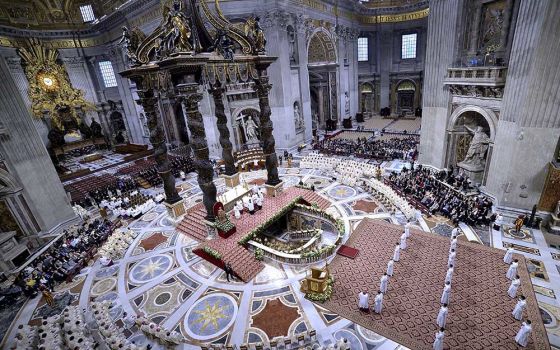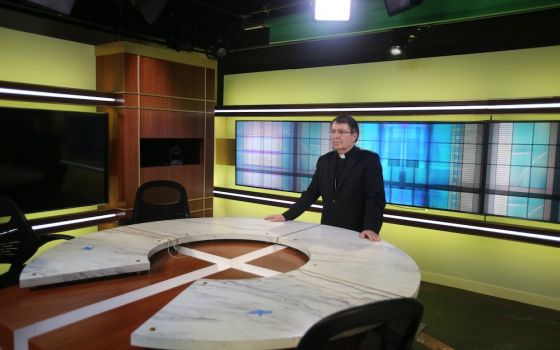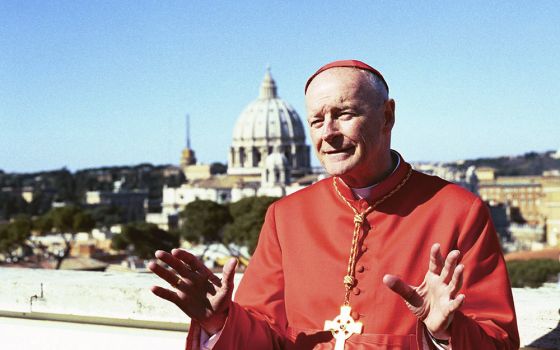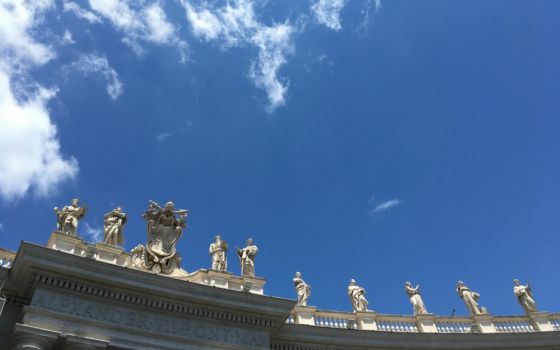
Then-Cardinal Theodore McCarrick arrives in procession for the Mass for the Election of the Roman Pontiff in St. Peter's Basilica at the Vatican in this March 12, 2013, file photo. (CNS/Paul Haring)
In August 2018, a former Vatican ambassador to the United States published an 11-page letter accusing dozens of church officials of a systemic cover-up for former Cardinal Theodore McCarrick and his serial sexual abuse of seminarians and calling for Pope Francis' resignation.
Yet when Pope John Paul II visited the United States in 1995, he began his tour in Newark, New Jersey, where he was welcomed by McCarrick, then the city's archbishop, at Sacred Heart Cathedral. More than 5,000 miles away, in Argentina, the future Pope Francis, Jorge Mario Bergoglio, was only then an auxiliary bishop.
For more than two years, Archbishop Carlo Maria Viganò's missive has fueled speculation over who in the United States and in Rome knew about McCarrick's predatory patterns of behavior and who might have enabled him. Since the publication of the letter, its author has been widely discredited and has been shown to have been complicit in allowing the former cardinal to continue in ministry.
Now, in the U.S. and beyond, Catholics are hoping that the Vatican's Nov. 10 release of its long awaited report on McCarrick will provide further answers as to how one of the American Catholic Church's most powerful figures of the late 20th century ascended the ranks of church leadership unchecked under the late Polish pope, using his fundraising prowess and connections on both sides of the Atlantic to advance his own career while abusing both minors and seminarians and evading informal sanctions placed on him by Pope Benedict XVI. He was eventually removed from the priesthood by Pope Francis in 2019.
"You've got a case study in an ecclesiastical train wreck that has done incalculable harm on the church in the United States," said Cathleen Kaveny, a professor of law and theology at Boston College.
"We need to find out who had influence and why did they have influence?" Kaveny told NCR, "We need to know what people knew and suspected and what led them to ignore it, and what prevented information that might have stopped this earlier from getting through."
While cautious not to speculate as to the report's contents, she said the release of the report will hopefully reveal "who was the pope listening to and why, and who were those people listening to?"
Anne Barrett Doyle, co-director of BishopAccountability.org — a website dedicated to documenting the abuse crisis — said she is expecting a "thorough accounting of who, what and when," regarding McCarrick's ecclesial career, and that if the report is to have credibility, "it must honestly identify the actions that were taken and the failures to act."
She told NCR that she will be looking specifically at what the report has to say about the archbishops of New York who enabled McCarrick's career, the bishops of Metuchen and Newark, New Jersey, who succeeded McCarrick in those dioceses, the seminary rectors who worked alongside him and the papal representatives to the United States.
Since news first broke in June 2018 that the New York Archdiocese had received allegations against McCarrick and that he had been removed from ministry, there has been no shortage of commentary that "everyone knew" about his misdeeds and turned a blind eye.
Kaveny said that one critical distinction to keep in mind in reading the report is the difference between rumors and evidence.
"If you hear a rumor about someone, that's not a sufficient reason to fire someone necessarily," she said. In the law, she noted that a higher burden of proof is needed in a criminal trial than there is in a civil trial.
"It's all easy to say retrospectively that 'everyone knew,' but what does that actually mean?" she asked. "What is the burden of proof that these people should have been looking for to act or investigate further?"
"There were an awful lot of people who had a sense that something was the problem but they weren't in a position to offer hard evidence," she added, noting that these distinctions are necessary when it comes to painting both a full and accurate picture of McCarrick's rise to power. These complexities may make assigning blame difficult.
Even so, Teresa Kettelkamp, who serves on the Vatican's Pontifical Commission for the Protection of Minors and is a former Illinois state police colonel and a former director of the U.S. Bishops' Child Protection Office, said the "Report on the Holy See's institutional knowledge and decision-making process related to former Cardinal Theodore Edgar McCarrick (from 1930 to 2017)," as it is officially titled, must be "an open and transparent document."
Catholics are looking for "truthfulness," she told NCR and "a document in which it won't beget a thousand questions," but instead will "cross all the t's and dot all the i's."
"As much as it might hurt, we want the truth," she said. "A thoroughly investigated truth. Nothing less will be satisfying."
Over the last two years, Barrett Doyle noted that more McCarrick victims have come forward due to new legislation that has extended the statute of limitations in New York and New Jersey, which has "given victims a chance to disclose more" about McCarrick. While many Catholics have lamented the long delay in the report's release, she noted that one upside is that as more victims have come forward, it has provided more facts about McCarrick and his associates.
Juan Carlos Cruz, a survivor of abuse who has been widely credited for Pope Francis' awakening to the abuse crisis in Chile, told NCR that he knows firsthand the power of such investigations if done well.
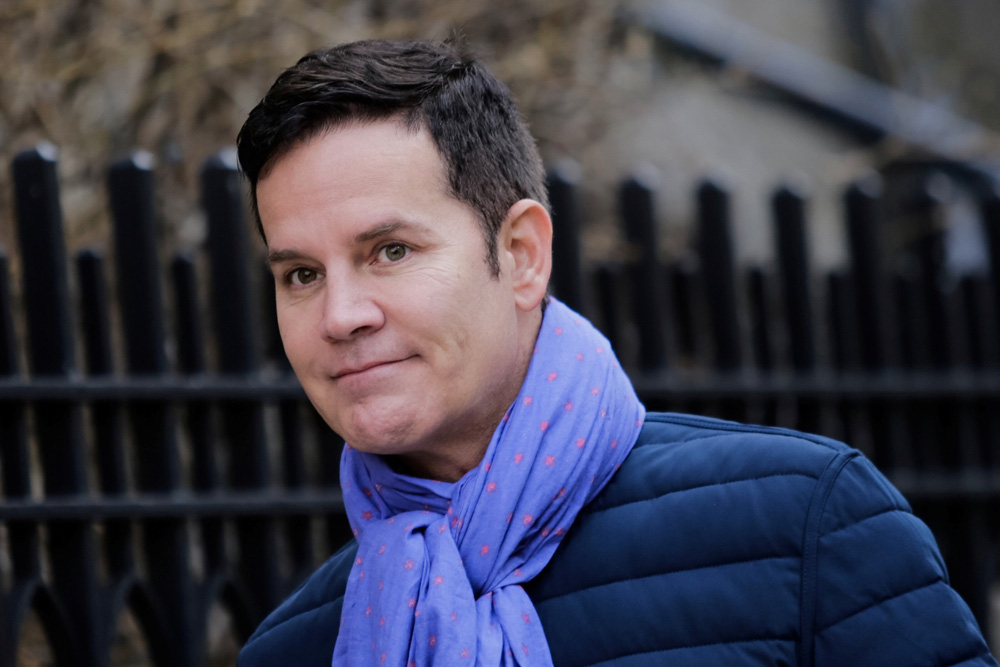
Juan Carlos Cruz smiles following a meeting with Archbishop Charles Scicluna of Malta, Italy, in late February 2018 at the Church of the Holy Name of Jesus in New York City. (CNS/Eduardo Munoz, Reuters)
In 2019, Francis sent the Vatican's top prosecutor on abuse, Maltese Archbishop Charles Scicluna, to Chile to investigate allegations by Cruz and others about systemic cover-up among the country's church hierarchy. The thousand-plus page report on their findings prompted almost all of the country's active bishops to offer their resignations, and led to an ongoing effort by Francis to remake the Chilean episcopacy.
"If it's the kind of report that's written the way it was done in Chile, many survivors will have clarity and hopefully there will be accountability," Cruz said of the McCarrick report.
"A survivor will never heal completely because of everything they suffer, but anytime a light is shown where there is darkness, it's very good," he continued. "I'm hoping the report has been delayed because more and more people spoke up and more and more people will feel that there is some kind of justice."
Yet Cruz also said that he expects some of Pope Francis' ideological opponents, such as Viganò, will try to use the report against him to score political points, making the report about homosexuality rather than abuse.
"Viganò was nuncio here," said Cruz. "What did he do to help survivors? Give me a break."
"The sudden crusaders who have been using survivors to hurt Francis hopefully will be exposed, as well," he added.
Advertisement
Similarly, Kaveny warned against a reading of the report from a particular ideological lens and for Catholics to "stop trying to enlist the McCarrick situation into your favorite political, ecclesiastical narrative."
"If you're going into the report simply proof texting to prove your ideology was right all along, that's not going to be a helpful way to approach the report," she said. "These situations kind of cross ideology."
Barrett Doyle said she would like to believe that the report's release "could be a chance for the Vatican and for the pope to gain in credibility in terms of their handling of the abuse crisis" for those inside and outside of the Catholic Church.
"This is potentially a Vos Estis investigation of Pope Francis and his two predecessors," she said, referencing the Vatican's newly enacted norms for bishop accountability, and noting that Francis' pledge of responsibility, accountability and transparency on abuse will be judged by what is included in the report and what is not.
"This is a real test of the curia's ability to police itself," she said. "Even though he took decisive action on McCarrick, it's a very important test for Pope Francis."
[Christopher White is NCR national correspondent. His email address is cwhite@ncronline.org. Follow him on Twitter: @CWWhite212.]





